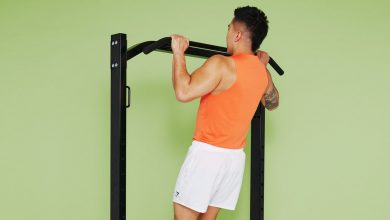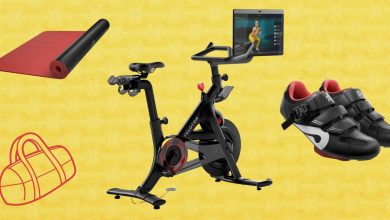Should I Worry If My Knees Crackle and Pop When I Squat?

There are certain sounds you expect to hear during a workout: heavy breathing, weights clinking on the rack, and the catchy melodies of a pump-up playlist. One that may very understandably catch you off guard? The cracking or popping in your knees as you lower down or stand up from a squat.
We get it, hearing that creak can be alarming. But let us offer some reassurance: “It’s pretty common,” physical therapist Brendan Overlid, DPT, CSCS, of UCHealth in Colorado, tells SELF. Even his knees do it on the reg, he says, and in lots of cases, it’s actually NBD.
The official term for joints making noises is crepitus, and when we’re talking knees specifically, there are a lot of different things that may cause this body part to “make a little bit of ruckus” when you squat, physical therapist Nicole Haas, PT, DPT, founder of Boulder Physiolab in Colorado, tells SELF. Here, we dig into what might be going on there—and whether it’s possible to calm that creaking.
1. Sorry, but you’ve got gas (not that kind).
Sometimes, that cracking or popping sound you hear as you push your hips back really just boils down to gas, since bubbles can naturally form in the fluid that surrounds your knee joint. When you bend your knee in a squat, you close that space and ultimately cause the bubble to pop and emit a sound, physical therapist Ryan Chow, PT, DPT, founder of Reload Physical Therapy and Fitness in New York City, tells SELF.
It’s the same mechanism that often causes popping and cracking noises in other joints, like your knuckles, for example. Typically, this type of sound comes with a release in pressure and is followed by a refractory period—meaning, there’s a certain amount of time you have to wait until that same pop would happen again, Dr. Overlid explains. So if you sink into a squat and hear a single squeak, but then start busting out some blessedly silent reps, this may be what’s going on.
What to do about it: Honestly, nothing. This is just one of those natural bodily functions!
2. Some harmless form quirks might be to blame.
The squat is a compound exercise, which means it involves many different muscles and joints working together, Dr. Chow explains. Given all the synchronization that has to happen, it makes sense that there can be lots of little nuances in how people squat. In some cases, these slight form quirks can lead to popping noises. For example, some people might inadvertently place more weight on the outside of their foot than the inside, and this uneven distribution can cause a buildup of pressure in the knee that ultimately leads to a cracking sensation and sound, Dr. Chow says.
In other cases, foot positioning can play a role—particularly, if you try to force a stance that’s not natural to you. In that case, you restrict your knee joints from moving freely and instead place extra stress on them, which can ultimately lead to a build up in pressure that causes that snap, crackle, or pop noise, Dr. Chow explains.
“Everyone’s stance is their own,” he explains. “Some people can be a little wider, some can be a little bit closer, some people can have more foot turned out, some can have less foot turned out.” It all depends on your unique anamatony, like the angle of your pelvic bones and the natural shape of your foot.
What to do about it: Squat with your feet positioned naturally rather than trying to force it a certain way—“it should feel easy and smooth to move up and down without losing balance,” Dr. Chow says. Not sure what this looks like? If you can, jump down from a small step: However your feet land is usually similar to what your natural stance would look like, Dr. Chow says. Now, if you’re hearing a creak and you’re not messing with your foot positioning, then as long as the sound isn’t accompanied by pain, then it’s probably okay and just natural.
3. Or your squat mechanics could actually be a little off.
Fighting with your natural stance isn’t the answer, but fixing some legit form issues with your squat might be. Squatting with improper form—specifically, allowing your knee to collapse inward or your thigh to wobble back and forth without control—can aggravate the tendons, ligaments, and fascia around the knee, Dr. Haas explains. That pattern can cause different surfaces to rub against each other or change the amount of tension in the structures that attach to the knee, possibly resulting in an audible pop or crack, she explains.
What to do about it: Even though popping due to faulty mechanics may not hurt off the bat, continuing to squat with poor form could eventually lead to pain, which is why it’s worth your while to learn how to execute the exercise correctly. Here are seven expert-backed tips that can help you master this foundational move. For safety’s sake, if you notice something wonky or off with your form, lighten up your weight as you try to correct it.
4. There’s some wear and tear.
Fun fact: Underneath your kneecap lives a lot of cartilage and a surface where your patella (kneecap) and femur (thigh bone) meet, Dr. Haas explains. As you move your knee, this surface glides back and forth. Lots of repetitive loading at the knee joint—say, with activities like running and squatting—can cause some wear and tear underneath the kneecap, which can then lead to small blips on this surface that can cause a grinding sensation and audible noise whenever it moves back and forth.“It’s almost like if you’re running your hand over a smooth surface versus if you’re running your hand over a bumpy surface,” Dr. Haas explains. “It just moves different.”
Now, this may sound bad, but as long as it’s not accompanied by pain or other red flags (which we’ll get to in just a moment), it’s actually pretty common and nothing to be that concerned about, Dr. Haas says.
In some cases, though, some squatting form issues (say, your knee collapses inward or your thigh wobbles back and forth when you squat), muscle imbalances (tight quads and weak glutes), and joint or tendon stiffness, can exacerbate the mechanics that create this type of popping sound, Dr. Haas says. Basically, if you already have noisy knees due to the wear and tear described above, adding these form issues on top of it can dial up the volume of the popping sound.
What to do about it: Though there’s not much to be done about wear and tear underneath the kneecap once it’s there (without the help of a physician), you can address the patterns, muscles imbalances, or joint or tendon stiffness that may exacerbate a popping sound caused by it and may help tamp down the sound (but likely wouldn’t eliminate it entirely). This could include making sure you’re squatting with proper form, strengthening your glutes, and regularly foam rolling to hit the tissues above and surrounding the knee, Dr. Haas says.
5. Perhaps you’ve got some arthritis.
Arthritis is basically joint inflammation, and it can happen when your hip, knee, ankle, or other area chronically takes on too much stress without enough recovery, Dr. Chow explains. “This is a long-term process,” he adds, and not something caused by a single workout. In the case of the knee, this could look like ramping up a running routine without penciling in enough downtime, or repeatedly doing lots of strength moves that load your knees on back-to-back days. This inflammation can cause the knee joint to rub, drag, and grind against another surface as it moves in a squat—which may possibly emit a sound—and is typically accompanied by discomfort (making it a bit different from the noise caused by surface blips above).
What to do about it: In the case of arthritis, it’s actually safe and recommended to exercise, but you need to do it in a manner that allows your joint to recover from all that work and build up strength, Dr. Chow explains. What’s appropriate on this front depends on a bunch of different personal factors—like genetics, lifestyle, and recent activity levels—which is why seeing a physical therapist can come in handy, as they can give unique-to-you recs. In general though, this could look like a mix of easy, short duration cardio sessions and basic leg-strengthening exercises, like squats, lunges, and deadlifts. Over time, you’d gradually progress these workouts to be longer or more challenging.
6. Your IT band is barking.
Your IT band is a tendon that runs along the outside of your leg from the top of your pelvic bone to just beneath the knee. When this tissue is tight, it can roll and catch on the bony part of your side thigh, Dr. Overlid explains. This typically happens when the knee is bent to about 30 degrees of flexion, he says (a position that happens as you lower down into a squat), and this catch and release can cause a clicking sound. This can also happen with biking and (more rarely) in running, too, Dr. Overlid says.
What to do about it: Even if that clicking isn’t painful, you should address a tight IT band, since it can lead to irritation if left untreated over time and show up in those other exercise situations too. Dr. Overlid recommends regularly foam rolling and stretching the IT band as well as your TFL (a hip flexor muscle) and glute max (biggest butt muscle), since those attach to your IT band. “When you loosen those, you decrease a little bit of tension in the IT band,” he explains. He recommends doing three rounds of 30 seconds each of a hip flexor stretch (like #1 here) as well as this belt strap IT band stretch, ideally after your workout (though if this tightness is causing you pain while squatting, you may want to do these beforehand to help alleviate that).
7. Two words: scar tissue.
If you have any scar tissue surrounding your knee—perhaps from a previous fall or injury—then that can create some friction around the knee and ultimately lead to a chorus of snappy, popping noises as you move back and forth in a squat, Dr. Haas explains.
What to do about it: Really nothing. So long as you’ve got good squatting form, and you’re not experiencing any of the red flags listed below—like pain, for instance—this is not worrisome or problematic.
So when should you get your noisy knees checked out?
Most of the time, it all comes down to pain. As long as your squeaky knees aren’t hurting while you squat, “then it’s really not anything to be concerned about,” Dr. Overlid says. But there are some instances in which you’d want to check in with a pro about noisy joints, since it could signal a problem worth addressing (like arthritis, a meniscus tear, or a dislocated kneecap, for instance). According to Dr. Haas, if you notice any of the following things happen as your knees crack, snap, or pop during squatting, abort mission and get checked out by a PT, sports medicine doctor, or other qualified pro.
- Pain that occurs alongside the noise, or within 24 hours afterward
- A change in the motion of your knee (for example, not being able to bend or straighten it)
- Bruising or swelling at your knee
- If your knee feels unstable
But if your melodious knees aren’t accompanied by any of these red flags? Then do your best to tune out the sound and focus instead on the fact that you’re doing your joints (and really, your entire body) a whole lot of good by strength training!
Related:



